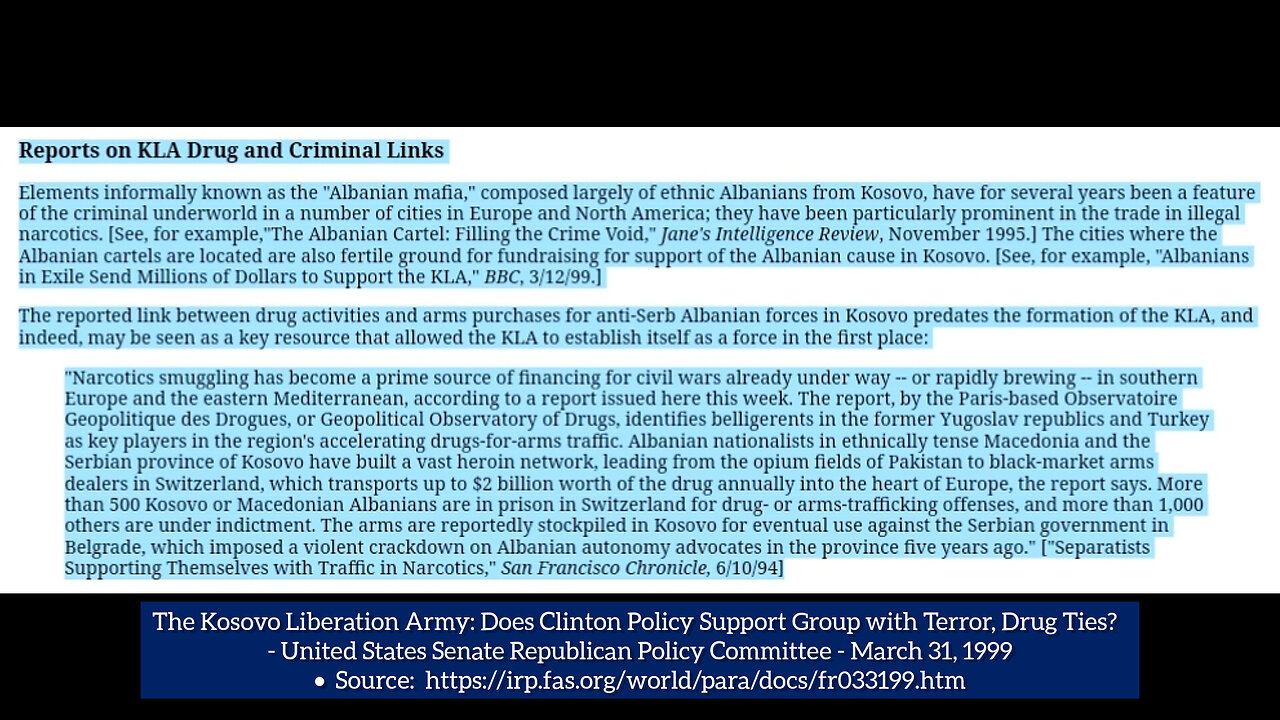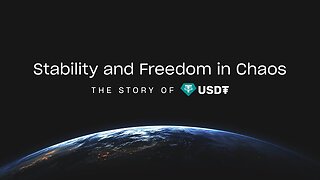Premium Only Content

Hopes Ukraine doesn't turn into Kosovo, a CIA, Narco Terrorist State - 11/15/23
11/15/2023 -
☆ Independent Journalist, Mike Krupa (Poland), Hope's Ukraine doesn't turn into Kosovo, a CIA, Narco Terrorist State and stolen from Serbia by the Deep State Department ☆
☆ KLA = UCK , a once labeled FTO, Foreign Terrorist Organization
• "Serbian officials say Mujahideen have formed groups that remained behind in Bosnia. Groups from Saudi Arabia, Yemen, and Chechnya are also involved in Albanian guerrilla operations. A document found on the body of Alija Rabic, an Albanian UCK member killed in a border crossing incident last July, indicated he was guiding a 50-man group from Albania into Kosovo. The group included one Yemeni and 16 Saudis, six of whom bore passports with Macedonian Albanian names. Other UCK rebels killed crossing the Albanian frontier have carried Bosnian Muslim Federation papers." [Jane's International Defense Review, "Unhealthy Climate in Kosovo as Guerrillas Gear Up for a Summer Confrontation," 2/1/99]
• The KLA: from 'Terrorists' to 'Partners'
The Kosovo Liberation Army "began on the radical fringe of Kosovar Albanian politics, originally made up of diehard Marxist-Leninists (who were bankrolled in the old days by the Stalinist dictatorship next door in Albania) as well as by descendants of the fascist militias raised by the Italians in World War II" ["Fog of War -- Coping With the Truth About Friend and Foe: Victims Not Quite Innocent," New York Times, 3/28/99]. The KLA made its military debut in February 1996 with the bombing of several camps housing Serbian refugees from wars in Croatia and Bosnia [Jane's Intelligence Review, 10/1/96]. The KLA (again according to the highly regarded Jane's,) "does not take into consideration the political or economic importance of its victims, nor does it seem at all capable of seriously hurting its enemy, the Serbian police and army. Instead, the group has attacked Serbian police and civilians arbitrarily at their weakest points. It has not come close to challenging the region's balance of military power" [Jane's, 10/1/96].
The group expanded its operations with numerous attacks through 1996 but was given a major boost with the collapse into chaos of neighboring Albania in 1997, which afforded unlimited opportunities for the introduction of arms into Kosovo from adjoining areas of northern Albania, which are effectively out of the control of the Albanian government in Tirana. From its inception, the KLA has targeted not only Serbian security forces, who may be seen as legitimate targets for a guerrilla insurgency, but Serbian and Albanian civilians as well.
In view of such tactics, the Clinton Administration's then-special envoy for Kosovo, Robert Gelbard, had little difficulty in condemning the KLA (also known by its Albanian initials, UCK) in terms comparable to those he used for Serbian police repression:
" 'The violence we have seen growing is incredibly dangerous,' Gelbard said. He criticized violence 'promulgated by the (Serb) police' and condemned the actions of an ethnic Albanian underground group Kosovo Liberation Army (UCK) which has claimed responsibility for a series of attacks on Serb targets. 'We condemn very strongly terrorist actions in Kosovo. The UCK is, without any questions, a terrorist group,' Gelbard said." [Agence France Presse, 2/23/98]
Mr. Gelbard's remarks came just before a KLA attack on a Serbian police station led to a retaliation that left dozens of Albanians dead, leading in turn to a rapid escalation of the cycle of violence. Responding to criticism that his earlier remarks might have been seen as Washington's "green light" to Belgrade that a crack-down on the KLA would be acceptable, Mr. Gelbard offered to clarify to the House Committee on International Relations:
"Questioned by lawmakers today on whether he still considered the group a terrorist organization, Mr. Gelbard said that while it has committed 'terrorist acts,' it has 'not been classified legally by the U.S. Government as a terrorist organization.' " [New York Times, 3/13/98]
The situation in Kosovo has since been transformed: what were once sporadic cases of KLA attacks and often heavy-handed and indiscriminate Serbian responses has now become a full-scale guerrilla war. That development appeared to be a vindication of what may have been the KLA's strategy of escalating the level of violence to the point where outside intervention would become a distinct possibility. Given the military imbalance, there is reason to believe the KLA -- which is now calling for the introduction of NATO ground troops into Kosovo [Associated Press, 3/27/99] -- may have always expected to achieve its goals less because of the group's own prospects for military success than because of a hoped-for outside intervention: As one fighter put it, "We hope that NATO will intervene, like it did in Bosnia, to save us" ["Both Sides in the Kosovo Conflict Seem Determined to Ignore Reality," New York Times, 6/22/98].
By early 1999, the Clinton Administration had completely staked the success of its Kosovo policy on either the acceptance by both sides of a pre-drafted peace agreement that would entail a NATO ground occupation of Kosovo, or, if the Albanians signed the agreement while Belgrade refused, bombing of the Serbs. By committing itself so tightly to those two alternatives, the Clinton Administration left itself with as little flexibility as it had offered the Albanians and the Serbs.
At that point for the Administration, cultivating the goodwill of the KLA -- as the most extreme element on the Albanian side, and the element which had the weapons capable of sinking any diplomatic initiative -- became an absolute imperative:
"In order to get the Albanians'... acceptance [of the peace plan], Ms. Albright offered incentives intended to show that Washington is a friend of Kosovo...Officers in the Kosovo Liberation Army would . . . be sent to the United States for training in transforming themselves from a guerrilla group into a police force or a political entity, much like the African National Congress did in South Africa." [New York Times, 2/24/99]
The Times' comparison of treatment of the KLA with that of the African National Congress (ANC) -- a group with its own history of terror attacks on political opponents, including members of the ethnic group it claims to represent -- is a telling one. In fact, it points to the seemingly consistent Clinton policy of cultivating relationships with groups known for terrorist violence -- not only the ANC, but the Palestine Liberation Organization (PLO) and the Irish Republican Army (IRA) -- in what may be a strategy of attempting to wean away a group from its penchant for violence by adopting its cause as an element of U.S. policy.
By the time the NATO airstrikes began, the Clinton Administration's partnership with the KLA was unambiguous:
"With ethnic Albanian Kosovars poised to sign a peace accord later Thursday, the United States is moving quickly to help transform the Kosovo Liberation Army from a rag-tag band of guerrilla fighters into a political force. . . . Washington clearly sees it as a main hope for the troubled province's future. 'We want to develop a good relationship with them as they transform themselves into a politically-oriented organization,' deputy State Department spokesman James Foley said. 'We want to develop closer and better ties with this organization.'
"A strong signal of this is the deference with which U.S. Secretary of State Madeleine Albright treats the Kosovar Albanians' chief negotiator Hashim Thaci, a 30-year-old KLA commander. Albright dispatched her top aide and spokesman James Rubin to Paris earlier this week to meet with Thaci and personally deliver to him an invitation for members of his delegation to visit the United States. Rubin, who will attend the ceremony at which the Kosovar Albanians will sign the accord, is expected to then return to Washington with five members of the delegation, including Thaci. Thaci and Rubin have developed a 'good rapport' during the Kosovo crisis, according to U.S. officials who note that Thaci was the main delegate they convinced to sign the agreement even though the Serbs have refused to do so. [ . . . ]
" '[W]e believe that we have a lot of advice and a lot of help that we can provide to them if they become precisely the kind of political actor we would like to see them become.' Foley stressed that the KLA would not be allowed to continue as a military force but would have the chance to move forward in their quest for self government under a 'different context.' 'If we can help them and they want us to help them in that effort of transformation, I think it's nothing that anybody can argue with.' "
Such an effusive embrace by top Clinton Administration officials of an organization that only a year ago one of its own top officials labeled as "terrorist" is, to say the least, a startling development.
Even more importantly, the new Clinton/KLA partnership may obscure troubling allegations about the KLA that the Clinton Administration has thus far neglected to address.
-
 1:02:50
1:02:50
The Dan Bongino Show
3 hours agoAre You Tired Of Winning Yet? (Ep. 2408) - 01/24/2025
448K975 -
 48:57
48:57
The Rubin Report
1 day ago'Real Time' Crowd Stunned as Bill Maher Gives a Brutal Message to Democrats with Adam Carolla
39.8K22 -
 1:01:52
1:01:52
Dr. Eric Berg
3 days agoThe Dr. Berg Show LIVE January 24, 2025
15.8K6 -
 38:56
38:56
Tudor Dixon
3 hours agoFrom Mob Life to Redemption with Michael Franzese | The Tudor Dixon Podcast
2.71K -
 LIVE
LIVE
The Shannon Joy Show
2 hours ago🔥🔥LIVE - Exclusive With Paul Stone! The Race For REAL. Trump’s Tariff Talk Sparking Mega Interest Gold, Silver, Land & Hard Assets🔥
743 watching -
 1:01:38
1:01:38
The Big Mig™
1 hour agoGlobal Finance Forum From Bullion to Borders
10.2K2 -
 11:50
11:50
MrBigKid
4 hours agoQuality AR15 for all? Cox Arms EMR-1 (Every Man's Rifle)
7.89K -
 53:25
53:25
tether
9 days agoStability and Freedom in Chaos: The Story of Tether USD₮ | Tether Documentary (USDT)
13.9K -
 1:28:09
1:28:09
Steven Crowder
3 hours ago🔴 EXCLUSIVE: J6 Prisoner Enrique Tarrio’s First Sit Down Interview Since Trump Pardon
93K320 -
 2:04:10
2:04:10
LFA TV
17 hours ago"ALL WILL BE REVEALED!" | LIVE FROM AMERICA 1.24.25 11am
32.8K14